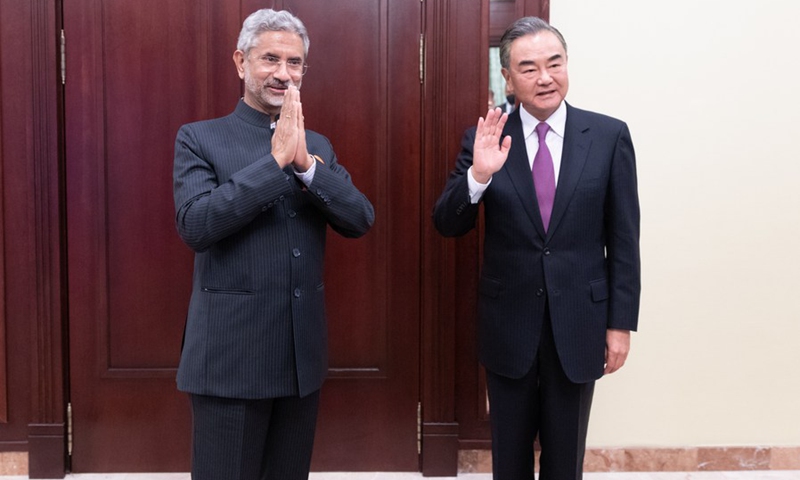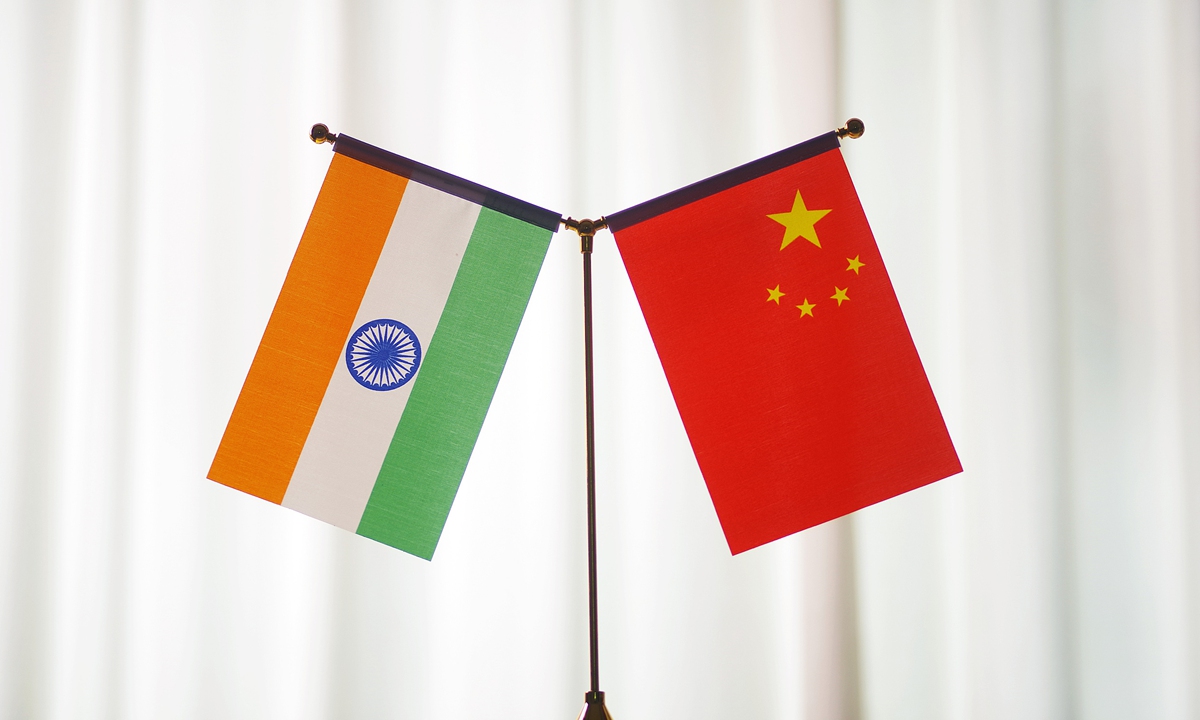Chinese-Indian foreign ministers reach consensus beyond expectations; peace depends on India keeping promise: expert
By Xie Wenting Source: Global Times Published: 2020/9/11 12:03:06

Chinese State Councilor and Foreign Minister Wang Yi (R) meets with Indian External Affairs Minister Subrahmanyam Jaishankar on the sidelines of a meeting of the Shanghai Cooperation Organization Council of Foreign Ministers in Moscow, Russia, on Sept. 10, 2020. (Photo: Xinhua)
The joint statement and five-point consensus reached by both Chinese and Indian foreign ministers in Moscow on Thursday evening marked a substantial step in cooling down the current border situation, exceeding the expectations of most international observers and creating favorable conditions for a possible future meeting between the leaders of the two countries, Chinese experts told the Global Times on Friday.
The successful implementation of the joint statement, however, depends on whether the Indian side can truly keep its word. Given the country's history, it is possible that the joint statement will end up as merely "paper talk," they warned.
China's State Councilor and Foreign Minister Wang Yi met with Indian Foreign Minister Subrahmanyam Jaishankar on the sidelines of the Shanghai Cooperation Organization foreign ministers' meeting in Moscow on Thursday evening and the meeting lasted nearly three hours. The highly anticipated meeting was viewed by experts from both sides as a last resort to peacefully resolve the recent border clashes, after previous meetings at the commander levels as well as last week's defense ministers' meeting in Moscow failed to garner true results.
In the five-point consensus, Wang and Jaishankar agreed that China and India should follow the guidance of the consensus reached between leaders of the two countries, including that divergence should not be escalated into conflicts. The current conflicts in border areas do not serve the interests of either side. The border troops of the two countries should continue their current dialogue, disengage as soon as possible, maintain necessary distances and ease the current tensions.

China India Photo:VCG
Qian Feng, director of the research department of the National Strategy Institute at Tsinghua University in Beijing, told the Global Times on Friday that the joint statement showed that under the current situation, the highest levels of the two governments are unwilling to further escalate conflicts as the de-escalation of tensions will be conducive to the two countries' interests.
Qian noted that the five-point consensus - the short and concise agreement by the two counties - plans the direction for the next phase of discussions.
The consensus involves maintaining communication through meetings by the Special Representatives of India and China and expediting the completion of new measures to build mutual trust, marking an important step since the conflicts first took place, he added.
However, given India's past history of breaking consensuses reached at such meetings, some Chinese experts stressed that it's still too early to pin high hopes on its implementation.
While the joint press release looks fine on paper, the actual addressing of future border tensions remains unclear as India has a long history of breaking its promises, Hu Zhiyong, a research fellow at the Institute of International Relations of the Shanghai Academy of Social Sciences, told the Global Times on Friday.
"We should not only observe what India says, but also what it does. For a country like India, the most important thing is how it acts," Hu said.
In 2005, then Chinese Premier Wen Jiabao held important talks with Indian Prime Minister Manmohan Singh before signing a joint statement by the two governments, in which both sides declared the establishment of a strategic partnership to promote peace and prosperity. The two governments also signed the Agreement on the Political Guiding Principles for Resolving the Boundary Issue between China and India, in which they pledged to reduce armed forces and maintain peace.
"However, since Modi assumed power, the Indian government has totally neglected this joint statement. China has kept its word, but the Indian side has provoked the recent border clashes," Hu told the Global Times, stressing that this time China should remain on high alert.
Given the country's sluggish economy and poor epidemic control, the Modi government may continue to try and stir up border tensions in an attempt to deflect the public's attention. These border tensions are used as chips to fool the public, he noted.

File photo:China Military
Becoming China's enemy not good
Analysts said that the agreement reached this time is also largely due to strong support from the Chinese military.
In a video recently released by China Central Television, the Chinese People's Liberation Army logistics soldiers were seen transporting hot food with ground vehicles, but also using unmanned aerial vehicles (UAVs) packed with food, water and medicine in areas where the roads were blocked, automatically delivering the "care packages" to frontline soldiers.
The logistics support could guarantee PLA soldiers an advantage in potential military conflicts when the winter comes, and analysts said that the advanced equipment shown by the Chinese military overshadows that held by its Indian counterparts.
"Only a strong military can wake up India, words are not enough," Hu said.
Hu noted that India's recent moves show that some forces there are trying to portray China as India's second-biggest enemy, with its first being Pakistan. "A series of hostile moves from India show it wants to de-couple from China, and replace China. However, this can never be realized. Going against China will only hurt Indian citizens," he said.

Photo:VCG
India recently tightened its visa policy on Chinese, and banned 59 apps linked to China, alleging that they are used in activities "prejudicial to the sovereignty and integrity of India, defense of India, the security of the state and public order."
After Thursday's meeting, Indian media kept a low coverage of the outcome, and some tried to stir up trouble like questioning whether the result shows India gave up its territory in the meeting. On Twitter, many Indians expressed dissatisfaction with the outcome, demonstrating strong nationalism and a warmongering spirit. Some accused Modi of having no courage to say "No" to China.
In contrast, the outcome of the meeting was widely reported on Chinese media. On Sina Weibo, most Chinese citizens said they "love peace" and believe the country is not afraid of a war if India fails its promise.
Hu Shisheng, director of the Institute of South and Southeast Asian and Oceania Studies at the China Institutes of Contemporary International Relations of Peking University, told the Global Times on Friday that Indian media lacks self-discipline. There are many media outlets in India and the competition is intense. So the media organizations like to hype topics to cater to the public's nationalist sentiment.
Qian said that peacefully resolving the border conflicts is important for India, as it would mean the government can then focus on addressing the country's other problems, which would bring real benefits for the people.
As nationalism prevails in India, it becomes a true test of Indian top politicians' wisdom not to be misdirected. The Indian government should have the ability to restrain and prevent radical military actions, he stressed.
Posted in: DIPLOMACY